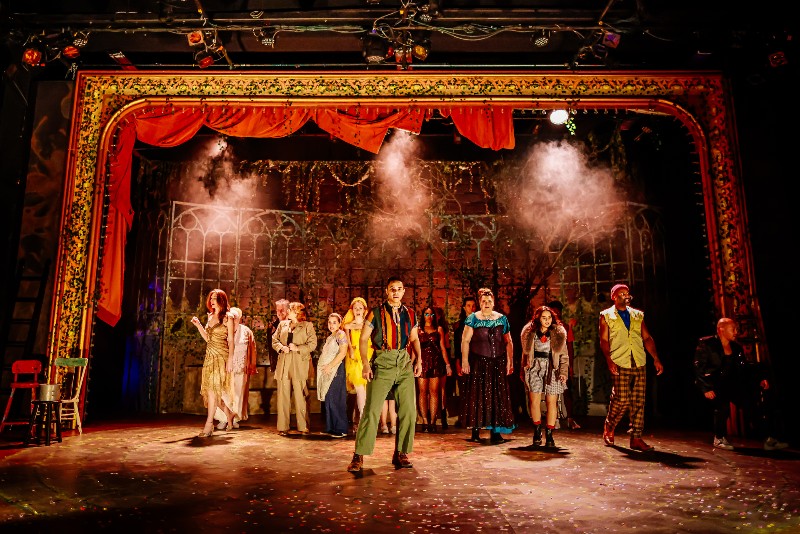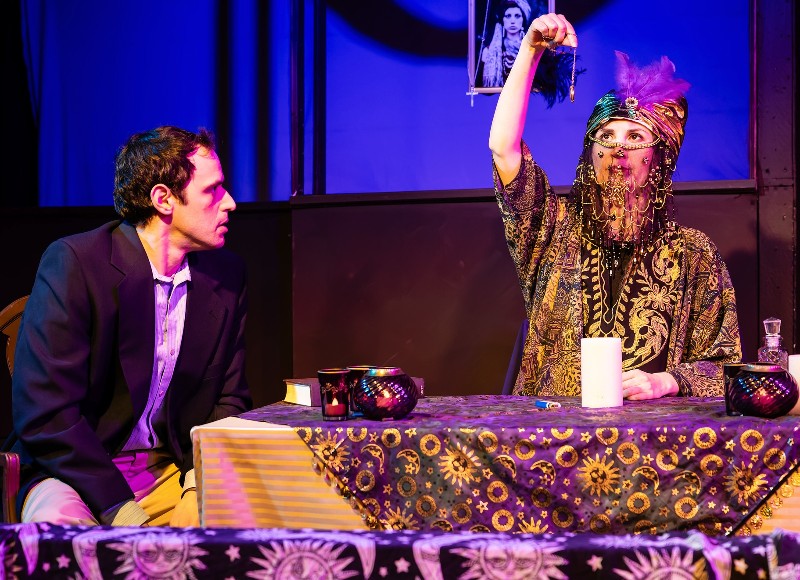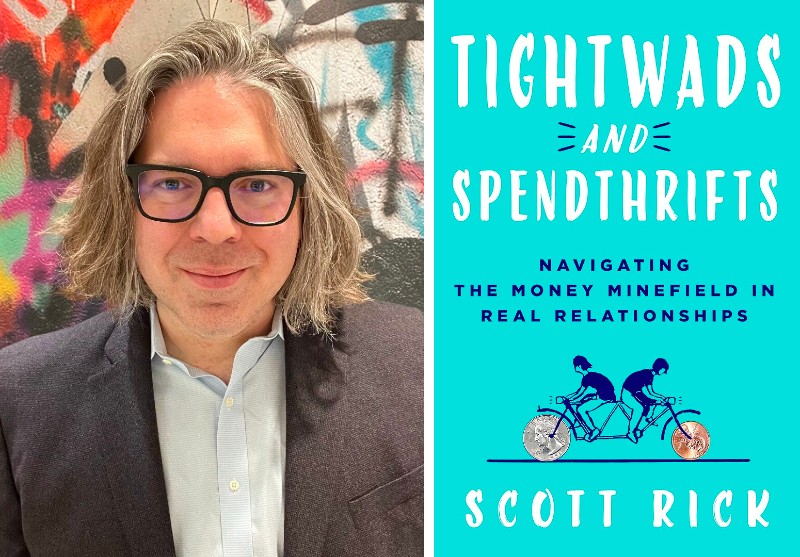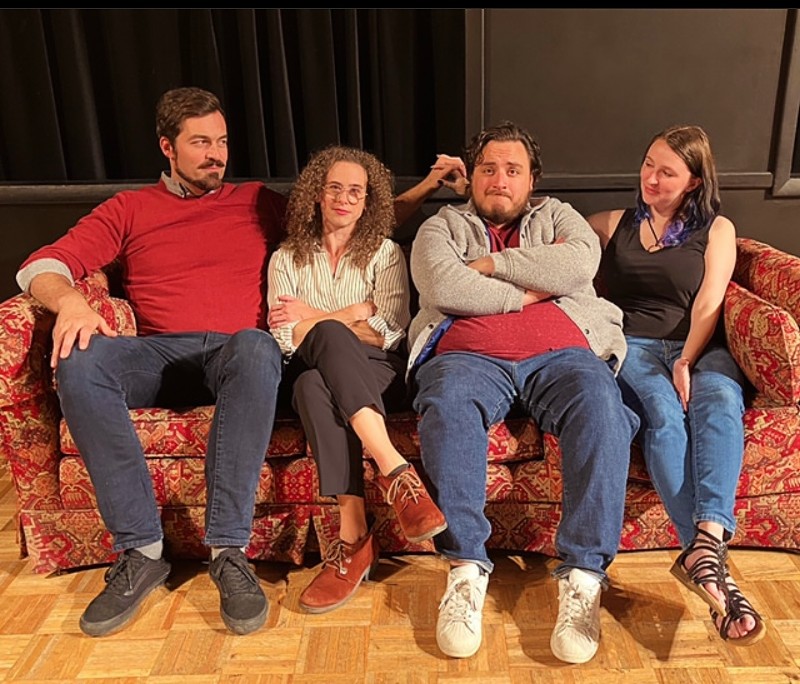U-M Presents a Swirling, Perfect Staging of Stephen Sondheim's "A Little Night Music"

It always amazes me.
Every year, the University of Michigan School of Music, Theatre & Dance is a magnet for the best, most talented musical theater stars on the horizon.
This weekend, all that training and dedication pays off in a swirling, funny, poignant, and smoothly executed production of A Little Night Music, with music and lyrics by Stephen Sondheim and book by Hugh Wheeler. Here, a large cast can show their innate talent and what they’ve learned on their way to future stardom at the Power Center for the Performing Arts.
Director Telly Leung, music director and conductor Catherine A. Walker, and choreographer and student Davey Burton Midkiff bring it all together.
A Little Night Music is, as a note says, “suggested by a film by Ingmar Bergman.” In U-M’s production, Wheeler keeps the main characters and the late 1800s Swedish setting. It’s mid-summer when the days run long, and a yearning for love is in the air. Wheeler makes room for Sondheim’s excellent music and razor-sharp lyrics, but also makes subtle changes that bend Bergman’s film in complex ways.
Encore Theatre hosts "Love Boat" vets in engaging, thoughtful "I’m Not Rappaport"

You remember The Love Boat? Sure you do.
On Saturday nights from the mid-'70s to the mid-'80s, the captain and his crew would help passengers find love, laughs, and life lessons.
Encore Theatre is taking a brief break from presenting musicals to showcase Herb Gardner’s I’m Not Rappaport, a funny, engaging, and thoughtful look at aging in the big city. It’s a perfect opportunity for a Love Boat reunion, bringing together Fred Grandy as the cruise ship purser Gopher; Ted Lange as Isaac Washington, the ship’s genial bartender; and Jill Whelan as Vicki Stubing, the captain’s daughter.
Two old men share a park bench in New York’s Central Park. Midge Carter (Lange) claims the bench for himself, a place where he can read a newspaper and hide from his obligations as a building superintendent. Nat Moyer (Grandy), a lifelong political lefty, loves to talk and wants to share his endless stories with the wary Midge. They’re an odd couple, who learn just how much they need each other.
Director Vincent Cardinal draws excellent performances from his veteran stars. They bring years of experience and a real love for the play they’re presenting. Cardinal balances physical comedy with the snappy and telling conversations that are the real heart of the play.
U-M’s take on Anton Chekhov's "Cherry Orchard" balances an awkward blend of comedy and tragedy

Is it a tragedy or a comedy?
Anton Chekhov, master short story writer and playwright, believed he had written The Cherry Orchard as a comedy, taking a jab at a rapidly fading way of life in rural Russia. When director Constantin Stanislavski directed the play for the Moscow Art Theatre in 1904, he directed a tragedy about a social order soon to be eclipsed by a very different social order.
The University of Michigan’s Department of Theatre and Drama balances the two points of view with mixed results.
In his program notes director Daniel Cantor acknowledges the shifting tone that leaves room for very different points of view.
Cantor writes, “What’s fascinating to me about The Cherry Orchard is that it contains intense contradictions: contradictions in style, theme, and action, and highly contradictory characters. It fully occupies a tragicomic perspective that is always moving, shifting, turning on a dime—whipping from the profound to the farcical, the spiritual to the absurd. And sometimes both at once.”
Mary Gaitskill Reflects on Her Latest Works and Extensive Career During U-M's Zell Visiting Writers Series Event

According to writer and University of Michigan alumna Mary Gaitskill, almost nothing is unbelievable and people are weird. Her work often reflects this notion with morally ambiguous characters, a gritty detailing of misconduct, and a complete rejection of clean-cut, black-and-white narratives.
Quin, the protagonist of her acclaimed 2019 novella, This Is Pleasure, is one of her weirdest characters. In Quin's mind, his flirtatious workplace actions weren’t all that bad. When women began coming forward about feeling violated, he became caught off guard.
“There was a cultural landscape for a while at least where he existed—I’m not saying it would be acceptable to everybody,” Gaitskill explained about Quin. “I’m sure he did offend some people, but because of his position, I think he didn’t realize he was offending people.”
Gaitskill shared her latest works and extensive literary experience during a March 21 reading and Q&A at the University of Michigan Museum of Art’s Helmut Stern Auditorium. Hosted by the Zell Visiting Writers Series, an annual showcase sponsored by The Helen Zell Writers’ Program, it brings fiction writers and poets to U-M’s campus to host public readings and lectures.
Initially published in The New Yorker, This Is Pleasure dominated literary circles due to its unlikely telling of a story of the “#MeToo” movement, a social campaign aimed at exposing people, especially those in positions of authority, involved in sexual misconduct.
It offers a complex narrative about two characters, Quin and Margot, who find themselves entwined with the tendrils of a public sexual misconduct scandal. Quin—a husband, father, and New York book editor—loses his career once young women start coming forward about his wrongdoings. Margot is Quin’s former co-worker, and after rejecting his sexual advances early in their working relationship, the two became close friends in the industry. When Quin’s name hits the front pages of tabloids, the two navigate the complex intersections of power, guilt, and manipulation.
Susan Goethel Campbell’s “Garden Repairs” traverses the intersection of natural and man-made worlds

Not long before visiting Ferndale-based artist Susan Goethel Campbell’s Garden Repairs installation at the U-M’s Institute of the Humanities, I’d shared a photograph on social media of a cluster of snow-dusted daffodils in my backyard, shriveled and hunched over. I’d been struck by how often nature mirrors human gesture; how these flowers visibly conveyed what many of us were feeling that morning, as we pulled winter coats and gloves back out of our closets, just days after walking around in shorts. I’d wondered if the natural world shaped the way our physical bodies communicate emotion, or if this is all, in fact, subtle, visible evidence of our inter-relationship with each other.
As it happens, this train of thought was a perfect foundation for experiencing Campbell’s work, which marries the natural and man-made worlds in surprising ways.
Theatre Nova's "the ripple, the wave that carried me home" explores how a family deals with a long fight for social justice

A social change agent who’s also a parent lives inside a paradox: Though they’re often driven by hopes of making the world a better place for their child, they must necessarily invest a vast amount of time and passion (that might otherwise be spent on the child) into their cause to even have a chance at moving the needle—and that child’s resentment can all-too-easily take root and grow.
This is one of the primary conflicts at the heart of Christina Anderson’s play the ripple, the wave that carried me home, now on stage at Theatre Nova. The 90-minute drama focuses on Janice (Bryana Hall), a woman living with her husband and sons in Ohio in 1992 as the L.A. riots—sparked by acquittals for the police officers who brutally beat Rodney King—unfold on television.
Encore Theatre's take on Stephen Sondheim’s fairy-tale mashup "Into the Woods" is filled with powerhouse vocals

It’s fitting that I watched Encore Musical Theatre Company’s new production of Into the Woods with my 12-year-old daughter.
Not just because the girl can sing every word of the show’s patter song (“Your Fault”)—she used to fall asleep listening to the show’s cast recording each night—but also because she now lives in that interstitial, fog-laden forest known as middle school, where preteens blindly fumble their way out of childhood.
And frankly, if I had to name one show that’s about the terrifyingly fraught and difficult process of growing up, it would be Stephen Sondheim’s Into the Woods.
A fairy-tale mashup that premiered on Broadway in 1987—long before the word “mashup” became such a regular part of our lexicon—Woods interweaves the stories of Cinderella (Ash Moran), Rapunzel (Lucia Flowers), Little Red Riding Hood (Sienna Berkseth), and Jack (Tsumari Patterson) and the Beanstalk.
How? By way of a cursed baker (Marcus Jordan) and his wife (Jessica Grové), who can’t have children until they gather the four items requested by the old witch next door (Jennifer Horne). But even when the couple succeeds, and everyone—fairy-tale protagonists included—gets what they want, in its darker second act Woods dares to venture beyond “happily ever after” and ask, “OK, now what?”
Comic Duet: Theatre Nova's "Fortune" is a rom-com with expert timing

This has been a chilly, wet, slippery, snowy winter, so it’s a perfect time to warm up with a rom-com—especially with Valentine's Day around the corner.
For Theatre Nova's production of Deborah Zoe Laufer’s Fortune, director Carla Milarch brings two talented actors together in a comical duet. It’s a good choice for Nova's tiny, sometimes cramped space. There are some lighting special effects, but most of the fireworks come from the actors who play two lonely people looking for love.
Madame Rosa is a fortune teller, like her mother. It’s a family business and a curse. Unlike other “fortune tellers,” Madame Rosa actually can look into the past and predict the future, but she'd rather be a secretary.
When not being Madame Rosa, she’s a lonely young woman named Maude who is afraid of what she can do and afraid to give up the business and do something about her life.
One day, a desperate young man demands that Madame Rosa read his fortune. He’s an awkward young accountant who has been regularly striking out in his attempts to find love. He wants to know what his future holds and doesn’t want it sugar-coated.
For Love and Money: U-M professor Scott Rick explores how couples navigate finances in "Tightwads and Spendthrifts"

In my family, I’m the person who insists on setting apart the cans that can be returned for deposit, while my husband says, “What do you get, three dollars? Not worth it.”
Perhaps not. But different philosophies about money, at the macro and micro level, are all-too-common in marriage. I mean, there’s a reason that finances always make the list of “things couples fight most about,” right?
To address these differences, Scott Rick, a U-M Ross School of Business marketing professor, has a new book called Tightwads and Spendthrifts: Navigating the Money Minefield in Real Relationships. Billed as distinct from conventional self-help or personal finance books, the book instead uses behavioral science as scaffolding for a broader discussion of how spending plays into our sense of personal identity; why we’re sometimes attracted to people who are quite unlike ourselves (in terms of spending); and practical ways to work through money-related conflicts.
A Fair of Affairs: Ann Arbor Civic Theatre's "The Real Thing" is all about the dangerous game of love

A typical Tom Stoppard play features a whole lot of words just to get to a basic point. It can be intellectually stimulating—or a wee bit draggy if you're looking for more action on stage.
But the high-energy Ann Arbor Civic Theatre production of Stoppard's The Real Thing that opened last Friday to a sold-out crowd flows at an excellent pace thanks to director David Widmayer and grips your attention throughout.
The play is set in 1980s London and focuses on two couples. Henry (Chris Grimm) is a playwright married to Charlotte (Kara Williams), an actress who frequently stars in Henry’s shows, including his current piece, House of Cards. They are good friends with Annie (Sara Long) and her husband Max (Manny Abascal Jr.), who is also an actor and starring in House of Cards with Charlotte.


































